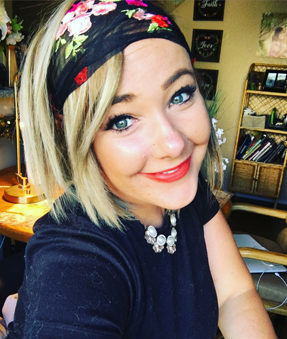
My name is Carrie, and I’ve lived in Las Vegas my whole life. Since I was 5 years old, my life has felt like a constant roller coaster of chaos, although at an early age I gained some coping skills that helped me survive childhood trauma. I adapted to living in a constant state of “fight or flight,” and it affected everything from my parents’ nasty 10-year-long divorce process to my adapting to my mother’s and father’s opposite expectations about mental illness and substance abuse. I felt the immense pressure of trying to be an adult for my siblings while shielding them from the trauma that had affected me. At the time, I didn’t realize how much these childhood experiences would affect me as an adult, and I never recovered from them in a healthy way such as through therapy.
I was 14 years old when my mental health disorders developed. My behavior and thinking changed drastically around that time and, hoping to ease my intense pain, I made a series of decisions that were self-destructive. I developed a tendency to isolate myself; I was drinking every weekend. I couldn’t concentrate on anything: not school, not friendships, not even self-preservation. I battled daily my feelings of extreme stress, sadness, loneliness, and anxiety.
By 20, I was spiraling out of control because of self-destructive decisions and progressively scarier thoughts—symptoms of undiagnosed mental health disorders. Feeling completely out of control inside my own mind led me to the deepest depression I have ever had. I was scared and exhausted all at the same time. This wasn’t how I was going to live the rest of my life, so I sought more precise answers from a mental health facility.
It’s hard to ask for help, right? But I am so glad I did: I had finally seen light at the end of the tunnel after 14 years. I talked with a doctor and was diagnosed with Major Depressive Disorder episodes, PTSD, and a severe form of Generalized Anxiety Disorder. But, after some time had passed, the treatment for these disorders wasn’t a great fit for me anymore. Again, I felt like I was stuck inside a body that I didn’t belong in, and I was terrified of my own brain. I had a no lack of control over my impulses, and my brain functioned at a rate of at least 100 mph. I always went to bed wondering what type of mood I’d wake up in. I wanted to give up, but that wasn’t an option.
Three months ago, I finally found the answer: I was told I’d been misdiagnosed, and that I actually have Bipolar 2. So, my journey continues—but in the meantime, I have become a wife and a mom, gone back to college, and am holding down a great full-time job.
I still have episodes and hard days, but the persistence to find answers and get help is what saved my life. I am in control of my symptoms now—not the other way around. I believe that all hard experiences can be turned into learning lessons. This one, in particular, has helped me stop comparing myself to others and to develop strong self-esteem. I have started to develop resilience to the adversities that come my way. I have hobbies again, I laugh with people, and I’m discovering who I am for the first time in what seems like forever! I was able to grow the most when I realized that happiness doesn’t start with a job or money: it starts with me. A resilient, positive mindset is a key to success, especially with mental health.
Bipolar, anxiety, depression, and PTSD are a huge part of me, but they don’t define me. They don’t define you. You will learn to manage your disorders once you receive proper treatment and have developed the skills, one by one, to love yourself. We all deserve that.


